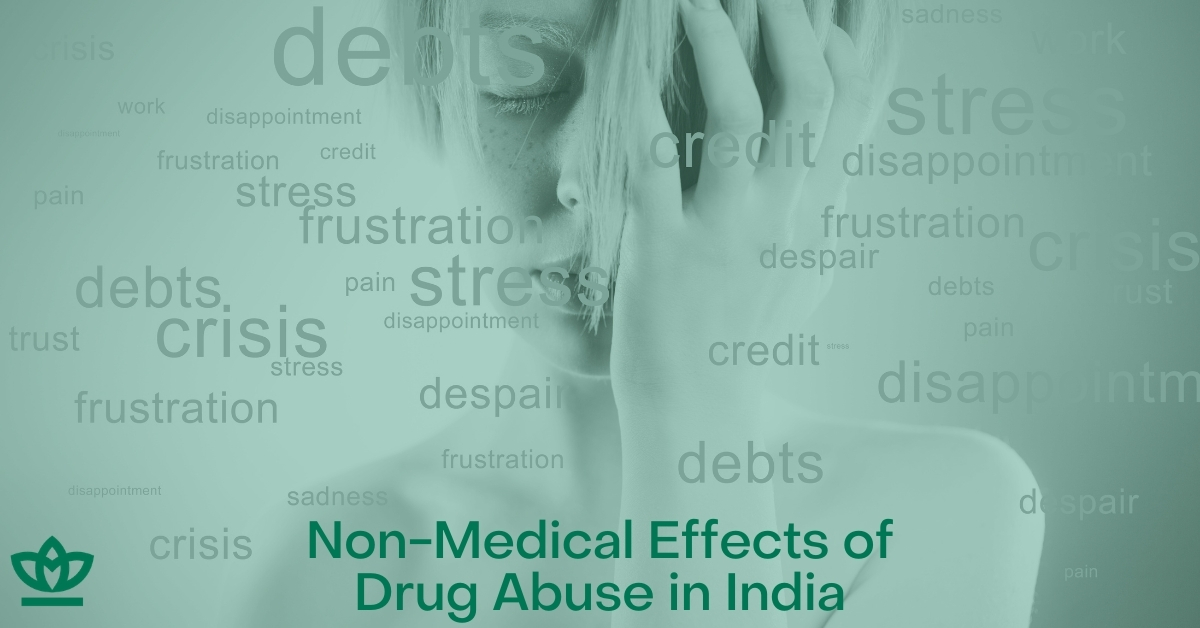Non-Medical Effects of Substance Abuse in India

Father sits inside waiting for the effect of his ecstasy pills to kick in. He lost his job two months ago. Mother rolls bidis under a homemade cloth tent outside trying to make ends meet for the family. Their two children would rather occupy the streets of Punjab looking for relief from their difficult life than experiencing the hardships of home. Sadly, their reprieve often comes in the form of illicit drugs: an increasingly popular way to avoid the harsh realities of Indian life.

The circumstances above demonstrate how drug addiction can have numerous non-medical effects. From tearing apart families, to destroying marriages, to disrupting finances, to leaving people socially inept and jobless – the non-medical effects of drug abuse exemplify the increasing corruption of Indian culture due to illicit drugs.
Drug Abuse Effects on Finances, the Family, and Job Security
Consider the ecstasy addict above. Imagine he is a relatively moderate user and only pops about three pills a week. Estimated to cost around Rs 1,200 a pill, this ecstasy user spends nearly Rs 4,000 weekly on his drug. The average Indian annual salary comes in around Rs 500,000. This ecstasy addict (if he were to find an average paying job) would be spending nearly 40% of his income on drugs!
[ref]http://www.payscale.com/research/IN/Country=India/Salary[/ref]
[pullquote]“The psychological tolls of drug abuse often extend to the entire family.”[/pullquote]
Most drugs don’t carry a price tag as high as ecstasy, but many approach Rs 1,000 per dose (particularly drugs that aren’t native to India are very costly). Illicit drugs can forcibly deduct dangerous amounts of money from addicts. Especially when an addict develops a dependent to a substance, the money originally allocated for food, clothing, and other necessities, gets squandered on drugs. And this is when addictions effect more than just the addicted; the influence supersedes the individual, and rubs off on those he closely relates with, namely his family.
[ref] http://archives.drugabuse.gov[/ref]
Other potential consequences of drug abuse as it relates to finances and family:
- Costs to families who break up due to one or both of the parents having drug addiction problems.
- When families have children who are addicted to drugs: intervention and treatment costs.
- Costs to employers for their drug-using employees’ absenteeism and reduced productivity, theft, and higher Workman’s Compensation claims due to accidents and injuries.
- Costs to the law enforcement and criminal justice systems to arrest, prosecute and incarcerate drug users who commit crimes while under the influence or to obtain money for buying drugs, as well as those who traffic in drugs.
- Costs to the health-care system of caring for drug users and those whom they injure.
- Costs to institutions, such as schools, that have to devote policies and processes and personnel to dealing with drug-using students.
[ref]http://www.getsmartaboutdrugs.com [/ref]
[ref]http://family.jrank.org/pages/1647/Substance-Abuse-Effects-Substance-Abuse-on-Families.html[/ref]
Social Effects of Drug Abuse

Drug addiction needs to be dealt with in all its dimensions. But a tailored plan, custom fit for all its effects, is nearly impossible. The ramifications of drug abuse range from purely emotional, to psychotic, to financial, and even to the spiritual effects on the individual. And the reality behind every illicit drug is the effect it has on the abuser’s social capabilities. These capabilities are severely limited.
Drug addiction needs to be dealt with in all its dimensions. But a tailored plan, custom fit for all its effects, is nearly impossible. The ramifications of drug abuse range from purely emotional, to psychotic, to financial, and even to the spiritual effects on the individual. And the reality behind every illicit drug is the effect it has on the abuser’s social capabilities. These capabilities are severely limited.
The real issue behind socially inept drug addicts is the effect that most illicit drugs have on the brain. They literally alter the brain, impacting the way the addict interacts with friends, family, and others. And the psychological tolls of drug abuse often extend to the entire family; impacting home-life and future choices for those living under the same roof as the addict.
Two other social consequences of drug abuse involve academics and explicit misbehavior (especially from youngsters). Statistics show that teens addicted to drugs have lower grades, are absent from school more often, and tend to drop out of school in greater numbers than those who abstain from drug use. The glaring reality linking drug abuse with delinquent behavior comes in as an undeniable effect of drug abuse. According to one report recently published by the United States Drug Enforcement Administration (DEA) says, “Substance abuse and delinquency are strongly correlated and often result in involvement with negative peer groups, as well problems in school and at home.”
[ref] http://www.getsmartaboutdrugs.com/identify/social.html [/ref]














